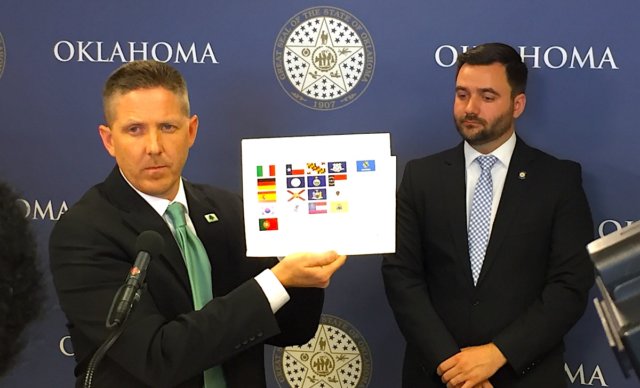

With teachers continuing to flood the Oklahoma State Capitol, some lawmakers are turning their attention toward reforming wind tax credits as a way to improve public funding by limiting payouts to energy companies.
This afternoon, Sen. Nathan Dahm (R-Broken Arrow) and Sen. Josh Brecheen (R-Coalgate) held a press conference to push for eliminating the refundability of wind tax credits, arguing that Oklahoma is on the hook for between $500 million and $750 million in payments to the wind industry over the next 10 years.
“It’s not right that we are raising everyone else’s taxes while we are subsidizing their business,” Dahm said. “We are doing this because we believe there are better ways to fund government than just raising taxes.”
Increasing state appropriations by changing rules on the wind industry has been a hot topic at the Capitol for the past two years. The industry has clashed with oil and gas leaders, who argued against raises on their taxes partially because they object to wind companies receiving payouts beyond their tax liability.
“There is opportunity while teachers are at the Capitol to overtake the influence of more than 50 wind lobbyists,” Brecheen said. “With teachers at the Capitol, it is our hope that they can overcome that influence.”
House Majority Floor Leader Jon Echols (R-OKC) said on Saturday that the public should expect the House to hear some measures on wind tax credits — or other elements of the industry — this week.
But Brecheen and Dahm asked Monday for the public to recognize the difference between a soft cap — that would allow for additional payments in later years — and a hard cap, which would eliminate the refundability entirely.
Yates: ‘Now they want to break every single promise’
Over the past three years, the Legislature has ended all new state incentives for wind energy, but many Republican lawmakers and oil and gas leaders have called for placing some sort of cap on existing wind tax credits. Some have also pushed for a new “production” tax on wind energy, which was part of the Step Up Oklahoma proposal that stalled in February.
Mark Yates, Oklahoma director of the Wind Coalition, issued a response statement Monday and criticized those who want to unravel the economic agreements previously made by the state.
“Here is what the public truly needs to understand. Oklahoma lured investors and developers to come to Oklahoma with incentives,” Yates said. “We worked side-by-side the last three legislative sessions to end incentives five years early, but now they want to break every single promise made to wind investors.”
Yates said that capping the wind tax credits “will result in lawsuits, bankrupt projects, ranchers missing land payments and school bonds losing their ratings.”
“It is obvious these legislators have a private agenda being driven by the one industry and two billionaires that want to run wind out of this state,” Yates said. “Oklahoma’s business reputation will be ruined for decades.”
But both of those senators said they believe their proposal — which failed in the form of an amendment Friday and could be considered in the House today via amendment to SB 888 — would be constitutional.
“In all my discussions with legal minds in prepping for this (…) when you announce that it’s the head of the calendar year and you give everyone fair warning, it puts us in tremendous legal footing,” Brecheen said.
Senate Majority Floor Leader Greg Treat (R-OKC) said Monday in his weekly press briefing that he favors some sort of “wind reform,” but that the hard cap pushed by Dahm and Brecheen would likely result in lawsuits and is political unfeasible.
“Politics is the art of the possible,” Treat said. “The hard cap is the most detrimental as far as collateral for wind companies. Most of them would default on their loans if a hard cap came out because they used that as collateral for their loans. I think we’ve artificially propped them up for too long. But, again, what I think and what I can pass are two different things.”
Treat said the House has been negotiating a new “production tax” that could be added to wind energy, either retroactively on all projects or only on new projects.
“Soft cap is doable. GPT is doable. But GPT (on wind) would have to originate in the House,” Treat said.
Wind Coalition distributes ‘Fact Sheet’
 Loading...
Loading...
(Editor’s note: The Wind Coalition is currently advertising on NonDoc.)




















